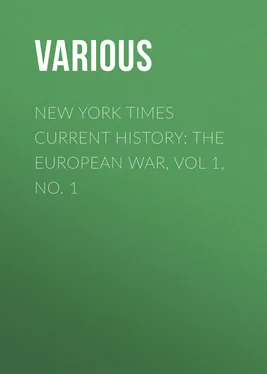Various - New York Times Current History - The European War, Vol 1, No. 1
Здесь есть возможность читать онлайн «Various - New York Times Current History - The European War, Vol 1, No. 1» — ознакомительный отрывок электронной книги совершенно бесплатно, а после прочтения отрывка купить полную версию. В некоторых случаях можно слушать аудио, скачать через торрент в формате fb2 и присутствует краткое содержание. Жанр: foreign_edu, periodic, История, на английском языке. Описание произведения, (предисловие) а так же отзывы посетителей доступны на портале библиотеки ЛибКат.
- Название:New York Times Current History: The European War, Vol 1, No. 1
- Автор:
- Жанр:
- Год:неизвестен
- ISBN:нет данных
- Рейтинг книги:4 / 5. Голосов: 1
-
Избранное:Добавить в избранное
- Отзывы:
-
Ваша оценка:
- 80
- 1
- 2
- 3
- 4
- 5
New York Times Current History: The European War, Vol 1, No. 1: краткое содержание, описание и аннотация
Предлагаем к чтению аннотацию, описание, краткое содержание или предисловие (зависит от того, что написал сам автор книги «New York Times Current History: The European War, Vol 1, No. 1»). Если вы не нашли необходимую информацию о книге — напишите в комментариях, мы постараемся отыскать её.
New York Times Current History: The European War, Vol 1, No. 1 — читать онлайн ознакомительный отрывок
Ниже представлен текст книги, разбитый по страницам. Система сохранения места последней прочитанной страницы, позволяет с удобством читать онлайн бесплатно книгу «New York Times Current History: The European War, Vol 1, No. 1», без необходимости каждый раз заново искать на чём Вы остановились. Поставьте закладку, и сможете в любой момент перейти на страницу, на которой закончили чтение.
Интервал:
Закладка:
On the whole, we can hector our way in the Prussian manner out of that discussion well enough, provided we hold our own in the field. But the Prussian manner hardly satisfies the conscience. True, the fact that our diplomatists were not able to discover the right course for Germany does not excuse Germany for being unable to find it for herself. Not that it was more her business than ours: it was a European question, and should have been solved by the united counsels of all the ambassadors and Foreign Offices and chanceries. Indeed it could not have been stably solved without certain assurances from them. But it was, to say the least, as much Germany's business as anyone else's, and terribly urgent for her: "a matter of life and death," the Imperial Chancellor thought. Still, it is not for us to claim moral superiority to Germany. It was for us a matter of the life and death of many Englishmen; and these Englishmen are dead because our diplomatists were as blind as the Prussians. The war is a failure for secret Junker diplomacy, ours no less than the enemy's. Those of us who have still to die must be inspired, not by devotion to the diplomatists, but, like the Socialist hero of old on the barricade, by the vision of "human solidarity." And if he purchases victory for that holy cause with his blood, I submit that we cannot decently allow the Foreign Office to hang up his martyr's palm over the War Office Mantelpiece.
The First Penalty of Disingenuousness.
The Foreign Office, however, can at lease shift its ground, and declare for the good cause instead of belittling it with quibbling excuses. For see what the first effect of the nonsense about Belgium has been! It carried with it the inevitable conclusion that when the last German was cleared off Belgian soil, peace-loving England, her reluctant work in this shocking war done, would calmly retire from the conflict, and leave her Allies to finish the deal with Potsdam. Accordingly, after Mr. Asquith's oration at the Mansion House, the Allies very properly insisted on our signing a solemn treaty between the parties that they must all stand together to the very end. A pitifully thin attempt has been made to represent that the mistrusted party was France, and that the Kaiser was trying to buy her off. All one can say to that is that the people who believe that any French Government dare face the French people now with anything less than Alsace and Lorraine as the price of peace, or that an undefeated and indeed masterfully advancing German Kaiser (as he seemed then) dare offer France such a price, would believe anything. Of course we had to sign; but if the Prime Minister had not been prevented by his own past from taking the popular line, we should not have been suspected of a possible backing-out when the demands of our sanctimoniousness were satisfied. He would have known that we are not vindicating a treaty which by accident remains among the fragments of treaties of Paris, of Prague, of Berlin, of all sorts of places and dates, as the only European treaty that has hitherto escaped flat violation: we are supporting the war as a war on war, on military coercion, on domineering, on bullying, on brute force, on military law, on caste insolence, on what Mrs. Fawcett called insensable deviltry (only to find the papers explaining apologetically that she, as a lady, had of course been alluding to war made by foreigners, not by England). Some of us, remembering the things we have ourselves said and done, may doubt whether Satan can cast out Satan; but as the job is not exactly one for an unfallen angel, we may as well let him have a try.
The Blank Cheque.
In the meantime behold us again hopelessly outwitted by Eastern diplomacy as a direct consequence of this ill-starred outburst of hypocrisy about treaties! Everybody has said over and over again that this war is the most tremendous war ever waged. Nobody has said that this new treaty is the most tremendous blank cheque we have ever been forced to sign by our Parliamentary party trick of striking moral attitudes. It is true that Mr. J.A. Hobson realised the situation at once, and was allowed to utter a little croak in a corner; but where was the trumpet note of warning that should have rung throughout the whole Press? Just consider what the blank cheque means. France's draft on it may stop at the cost of recovering Alsace and Lorraine. We shall have to be content with a few scraps of German colony and the heavy-weight championship. But Russia? When will she say "Hold! Enough!" Suppose she wants not only Poland, but Baltic Prussia? Suppose she wants Constantinople as her port of access to the unfrozen seas, in addition to the dismemberment of Austria? Suppose she has the brilliant idea of annexing all Prussia, for which there is really something to be said by ethnographical map-makers, Militarist madmen, and Pan-Slavist megalomaniacs? It may be a reasonable order; but it is a large one; and the fact that we should have been committed to it without the knowledge of Parliament, without discussion, without warning, without any sort of appeal to public opinion or democratic sanction, by a stroke of Sir Edward Grey's pen within five weeks of his having committed us in the same fashion to an appalling European war, shews how completely the Foreign Office has thrown away all pretence of being any less absolute than the Kaiser himself. It simply offers carte blanche to the armies of the Allies without a word to the nation until the cheque is signed. The only limit there is to the obligation is the certainty that the cheque will be dishonoured the moment the draft on it becomes too heavy. And that may furnish a virtuous pretext for another war between the Allies themselves. In any case no treaty can save each Ally from the brute necessity of surrendering and paying up if beaten, whether the defeat is shared by the others or not. Did I not say that the sooner we made up our minds to the terms of the treaty of peace, so that we might know what we were fighting for, and how far we were bound to go, the better? Instead of which we sign a ridiculous "scrap of paper" to save ourselves the intolerable fatigue of thought.
Belgium Crucified Between the European Powers.
And now, before I leave the subject of Belgium, what have we done for Belgium? Have we saved her soil from invasion? Were we at her side with half a million men when the avalanche fell on her? Or were we safe in our own country praising her heroism in paragraphs which all contrived to convey an idea that the Belgian soldier is about four feet high, but immensely plucky for his size? Alas, when the Belgian soldier cried: "Where are the English?" the reply was "a mass of concrete as large as a big room," blown into the air by a German siege gun, falling back and crushing him into the earth we had not succeeded in saving from the worst of the horrors of war. We have not protected Belgium: Belgium has protected us at the cost of being conquered by Germany. It is now our sacred duty to drive the Germans out of Belgium. Meanwhile we might at least rescue her refugees by a generous grant of public money from the caprices of private charity. We need not press our offer to lend her money: German capitalists will do that for her with the greatest pleasure when the war is over. I think the Government realizes that now; for I note the after-thought that a loan from us need not bear interest.
Now that we begin to see where we really are, what practical morals can we draw?
Unpreparedness the Price of Secrecy.
First, that our autocratic foreign policy, in which the Secretary for Foreign Affairs is always a Junker, and makes war and concludes war without consulting the nation, or confiding in it, or even refraining from deceiving it as to his intentions, leads inevitably to a disastrous combination of war and unpreparedness for war. Wars are planned which require huge expeditionary armies trained and equipped for war. But as such preparation could not be concealed from the public, it is simply deferred until the war is actually declared and begun, at the most frightful risk of such an annihilation of our little peace army as we escaped by the skin of our teeth at Mons and Cambrai. The military experts tell us that it takes four months to make an infantry and six to make a cavalry soldier. And our way of getting an army able to fight the German army is to declare war on Germany just as if we had such an army, and then trust to the appalling resultant peril and disaster to drive us into wholesale enlistment, voluntary or (better still from the Junker point of view) compulsory. It seems to me that a nation which tolerates such insensate methods and outrageous risks must shortly perish from sheer lunacy. And it is all pure superstition: the retaining of the methods of Edward the First in the reign of George the Fifth. I therefore suggest that the first lesson of the war is that the Secretary of State for Foreign Affairs be reduced to the level of a simple Prime Minister, or even of a constitutional monarch, powerless to fire a single shot or sign a treaty without the authority of the House of Commons, all diplomatic business being conducted in a blaze of publicity, and the present regulation which exacts the qualification of a private income of at least £400 a year for a position in the Diplomatic Service replaced by a new regulation that at least half the staff shall consist of persons who have never dined out at the houses of hosts of higher rank than unfashionable solicitors or doctors.
Читать дальшеИнтервал:
Закладка:
Похожие книги на «New York Times Current History: The European War, Vol 1, No. 1»
Представляем Вашему вниманию похожие книги на «New York Times Current History: The European War, Vol 1, No. 1» списком для выбора. Мы отобрали схожую по названию и смыслу литературу в надежде предоставить читателям больше вариантов отыскать новые, интересные, ещё непрочитанные произведения.
Обсуждение, отзывы о книге «New York Times Current History: The European War, Vol 1, No. 1» и просто собственные мнения читателей. Оставьте ваши комментарии, напишите, что Вы думаете о произведении, его смысле или главных героях. Укажите что конкретно понравилось, а что нет, и почему Вы так считаете.











